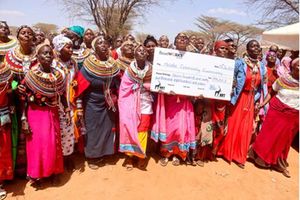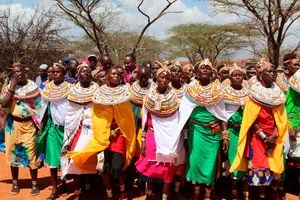
Jane Kailikia, the group leader of the Satubo women's group, during an interview at their workshop in Jerusalem village, near Segera retreat, in Laikipia County on April 10, 2024.
On a Saturday afternoon in a village in Laikipia plains, a group of women adorned in multi-coloured beaded jewellery sit in a circle under a grass-thatched shed.
Their hands and eyes are glued on a bow with coloured beads, placed on their laps. Using thin wires, they pick the tiny beads. This is the first step in making beaded fashion accessories, which have caught the eye of international luxury brands such as Giorgio Armani, Gucci, and Vivienne Westwood.
Their fashion business started during the 2007 post-election violence, when thousands of Kenyan families fled their homes.
“As women, we could not flee very far because we had young families to take care of and we had nowhere else to go. We found ourselves cooped up in our local church. We were 20 women from Samburu, Turkana and Borana. We soon realised that we shared a common skill of beadwork. We decided to monetise it by making our traditional accessories and selling them,” says the chairperson of the group, Jane Kailikia.
They founded Satubo Women Self-Help Group, (Satubo is the acronym representing the three founding tribes) to promote co-existence between three dominant rival communities in Segera Ward.
Satubo became a model for women’s economic empowerment and breaking cultural barriers. In the group, age, marital and social status or education levels are relegated to the backseat.
“The group soon grew. We’re over 60 women now, aged 22 to 75 years old,” says Ms Kailikia.
Rose Ashuka, 64, is another member of the Satubo. She joined the group with her daughter and daughter-in-law. They are below 30 years old.
“They are both educated to Form Four level, but I took the initiative of training them, (daughter and daughter-in-law) to make these ornaments to earn extra income,” she says.
For Ms Ashuka who has never stepped into a classroom, beadwork is a talent she learnt from her parents and perfected the art through engagement with other women at Segera Gate Village. Now, she is proud to transfer the skills to the younger generation.

Patricia Lengees poses for a photo after the interview at Don Bosco Technical Institute, Karen Nairobi on April 16, 2024.
Every two weeks, she places her order for beads from a shop in Nanyuki Town, some 50 kilometres away, to make items to add to her stock of ornaments. Once she makes her ornaments, she stores them collectively, but every member knows her piece.
“We keep records of all accessories of every member to ensure fair revenue sharing,” says Ms Kailikia.
Passion has seen the women perfect their craftsmanship and they proudly display beaded sculptures of wildlife, birds and reptiles they handmade by coiling thin wires into desired animal shapes.
It is the artistry involved in creating these items that is seen as a mark of luxury and sophistication, attracting the likes of Gucci and Vivienne Westwood.
Ms Kailikia says they have just finished working on a large order from Vivienne Westwood.
“This is our first big order of with luxury brands. We were first trained on how to sew and make these high-quality accessories. After the products are ready and packaged, they are picked up at our factory in Laikipia and shipped abroad,” she told Lifestyle.
The beadwork is paying off. One of the major investments that the women take pride in is the establishment of a cultural centre, built on land that they bought.
Here, a two-room house that also serves as a workshop at times stands out from a distance. It is makuti-thatched, one of the very few in a neighbourhood, dotted with traditional huts.
The shelves in this showroom are bursting with unique displays of value-added bead products and tassels, a step ahead of other common beaded items such as bracelets, necklaces, earrings, decorated leather belts and walking sticks.
Prices
The majority of the women may have little or no understanding of the world-renowned designer brands but they are aware some buyers from Europe have developed an interest in their products.

The Satubo group members at Don Bosco Technical Institute, Karen Nairobi on April 16, 2024. Satubo is a women’s group in Segera Gate Village in Laikipia County.
“Previously, we sold our items to tourists visiting the nearby Segera Ranch (a wildlife conservancy) with prices ranging from Sh500 for earrings to Sh8,000 for a beaded decorated leather belt, but recently, I heard there are some big companies based in Europe that want to give us a tender to supply them with some of the ornaments we make here,” says an elated Consolata Akai. She is 45 years old.
Peace
Across the horizon of the Sabuto Cultural Centre are livestock grazing peacefully on the lush pastures, thanks to the ongoing rainfall and a seed of peace planted here by women 15 years ago.
“The three communities, (Samburu, Turkana and Borana) also came together to promote peace using beads following the disputed 2007 General Election. We experienced heightened conflicts resulting in massive livestock theft and displacement of some communities from this region,” explains Ms Nailikia.
She adds that the peace-building process involved each woman surrendering her valued necklace, a common form of adornment among pastoral communities, dismantling it and using the old beads to make new necklaces which would be exchanged with a woman from a perceived rival community as a form of the covenant to keep and promote peace.
Incidentally, this welfare group was not a profit making initiative at first but a community unifying strategy which has grown over the years through solid investments and is now set to be converted into a shareholding company.
This development came about following a training initiated by the Ethical Fashion Initiative (EFI), marking a turning point in transforming their passion into an income-generating activity.
EFI is a flagship programme of the International Trade Centre, a joint agency of the United Nations and World Trade Organisation which promotes sustainable and inclusive development through increased trade and employment in the creative and cultural industries, fashion and textiles.

Joyce Lesirewa, a member of the Satubo women's group, makes an item at their workshop in Jerusalem village, near Segera retreat, in Laikipia County on April 10, 2024.
“Initially, they were not saving, hindered by low levels of formal education, lack of proper identification card (IDs), and long distance to the nearest banking facility among other hurdles. They were simply a people excluded from the main economic functioning of the region and the country at large. We supported them through demand-driven training. The formation and registration of the group enabled Sabuto women to grow exponentially. With the legitimacy afforded by the registration certificate, they opened a bank account which allowed them to receive secure payments and collectively save for future development,” says Vincent Odour, Programme Management Officer at EFI.
The group evolved and is now under the Tujikuze Initiative.
“Following this training, we resolved to save 30 percent of the sale of the items in the bank while 70 percent would be pocketed by the woman who had made that particular item. This was the first step towards purchasing a piece of land, a dream we achieved in 2014 when we bought one acre at a cost of Sh150,000,” says Ms Kailikia.
Over the years, the women have kept their dream alive and currently own 11 acres of land which they have subdivided and allocated each of the 20 founder members a half an acre plot.
“We have bought 11 acres of land which we subdivided among ourselves and retained one acre for our factory and future expansions, and to build a school closer to our home,” says Ms Kailikia.
“Our husbands are pastoralists who keep on migrating in search of pasture and have little value for land or permanent settlement, preferring instead to live on temporary structures where their animals are grazing at a given time. With permanent homes, our children will no longer be herders or school dropouts or teen mothers, getting pregnant while herding in the bushes,” says the chairperson.
The group is now set to register a company with external shareholding where 40 other active but non-founder members will be incorporated in owning the investment group with the immediate focus being to expand their beadwork business, specialise in making branded designer women’s handbags for international markets and engage in land buying business.
Another milestone by the group is a borehole project that supplies water to more than 100 households in this parched region of Laikipia County where water is sourced over five kilometres away at River Ngareng’iro.
The water is metered and piped to the nearby homesteads where beneficiaries pay monthly subsidised bills to support maintenance costs. The solar-powered water source stands next to the cultural centre which they build through support from donors.
They are now looking to empower more women from marginalised communities.
“We have since then trained more women on the same skill from different tribes in Kenya. We believe in empowering other women since we all share the same struggles,” says Ms Kailikia.







